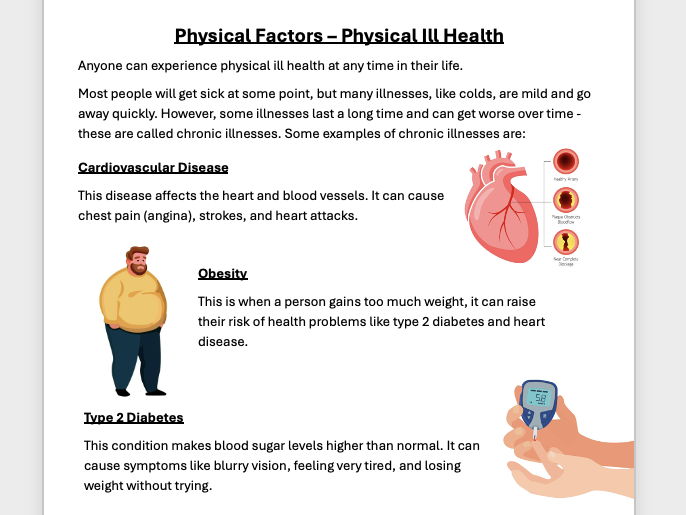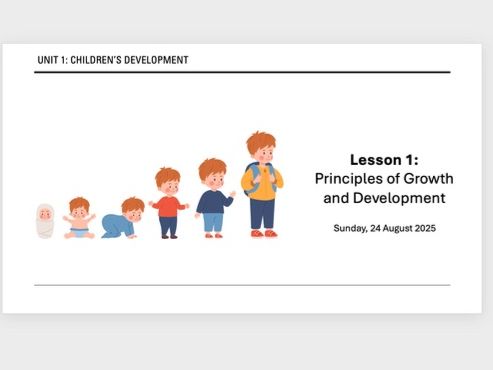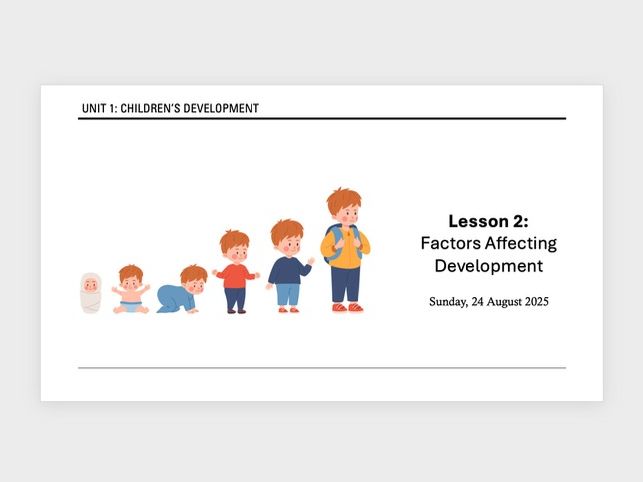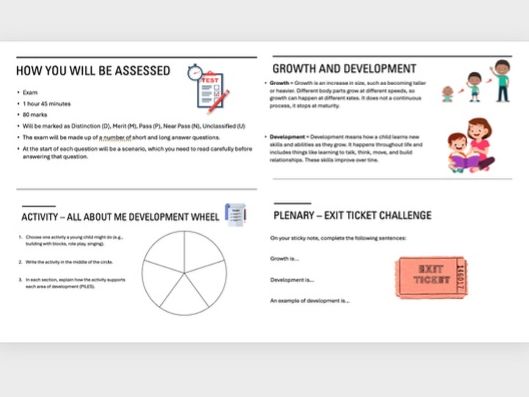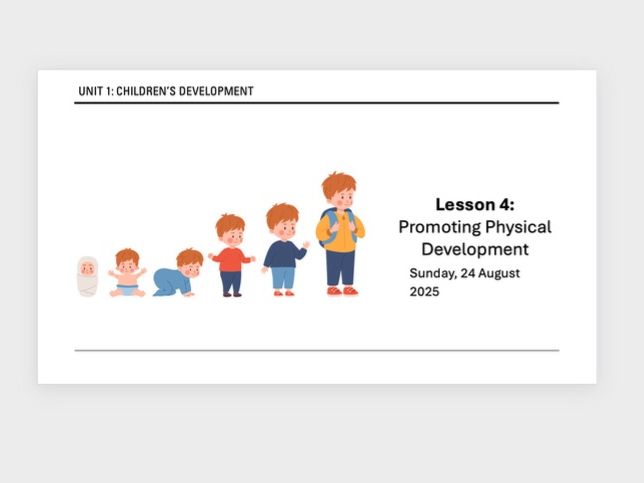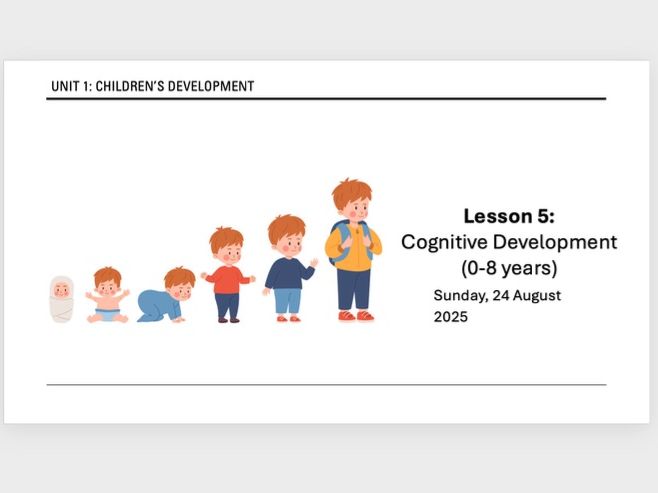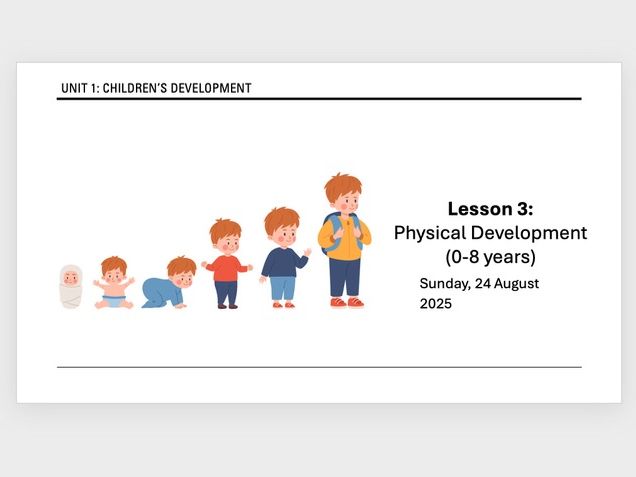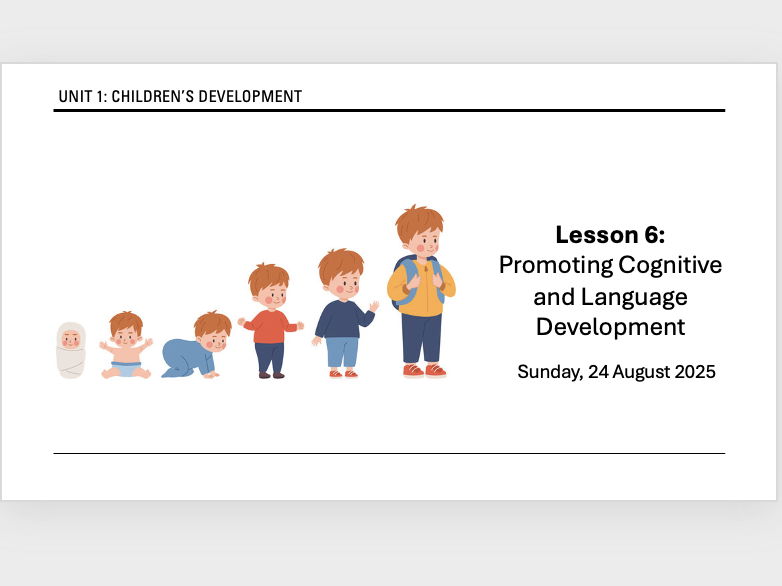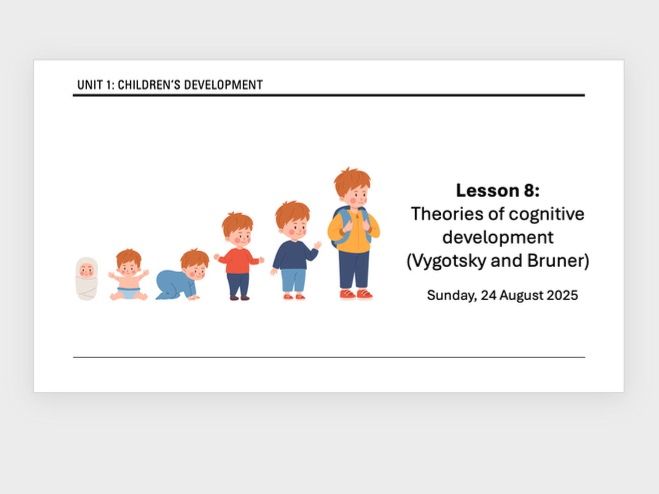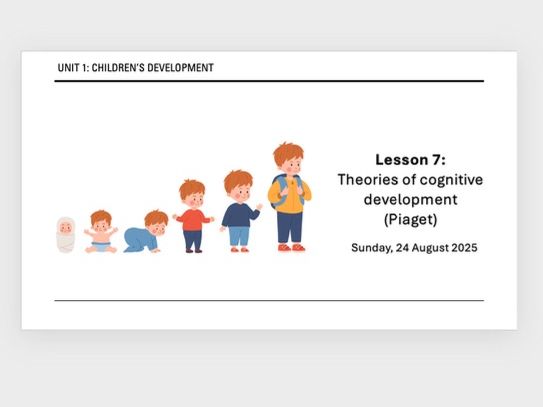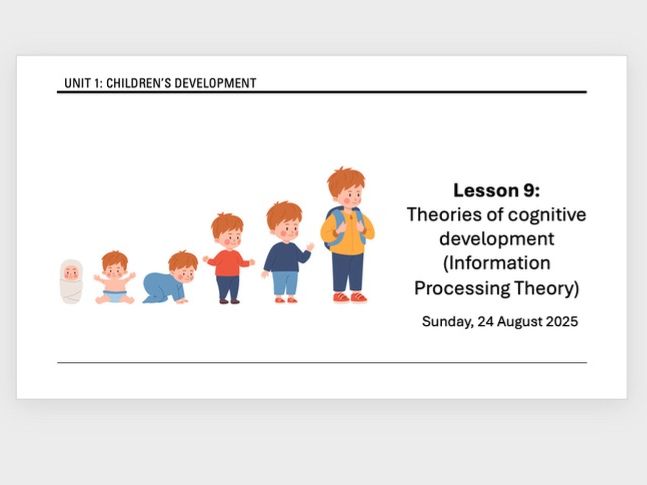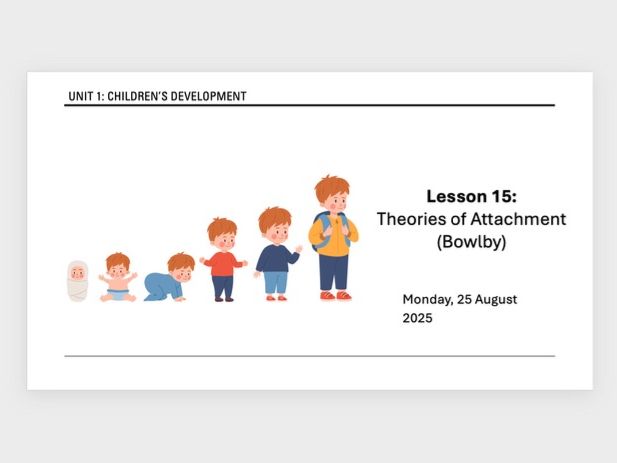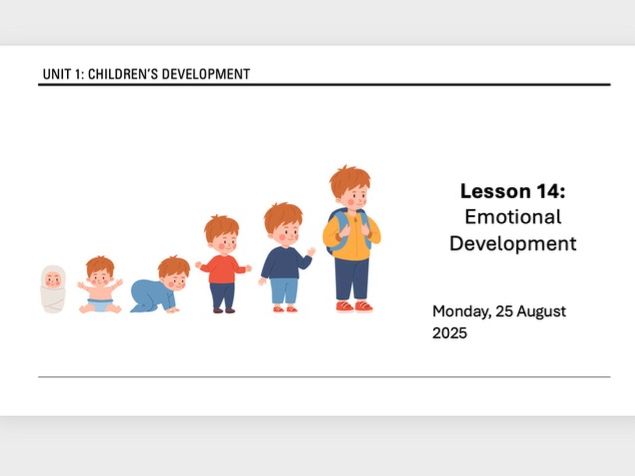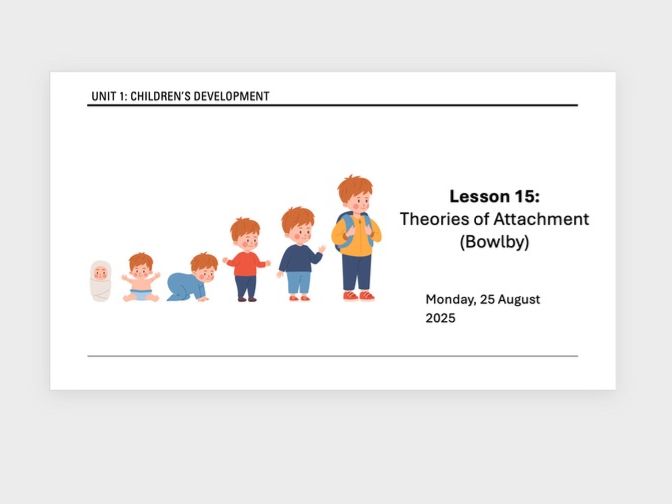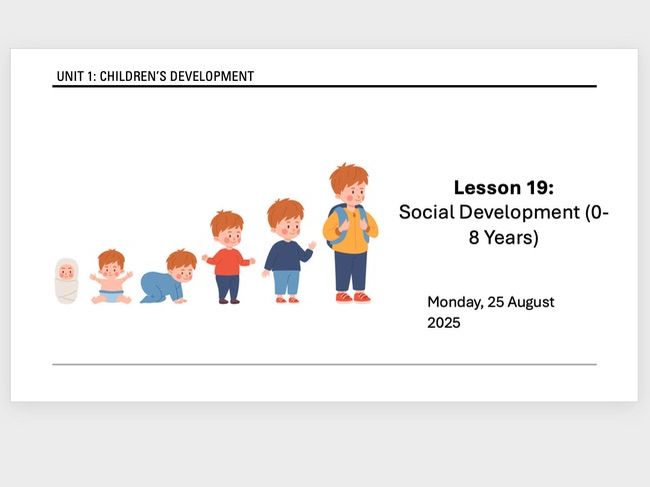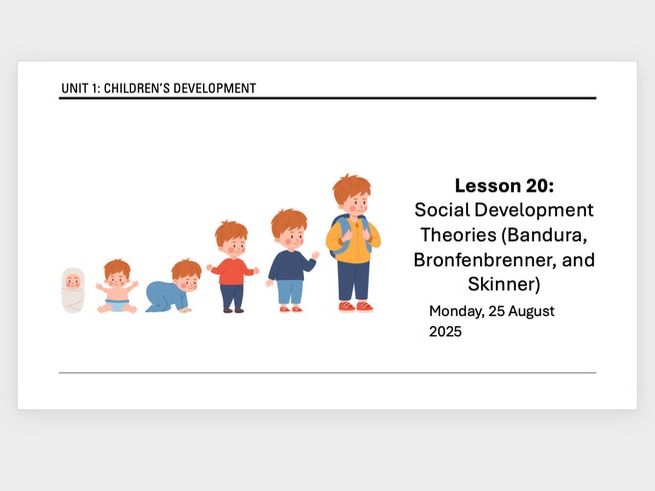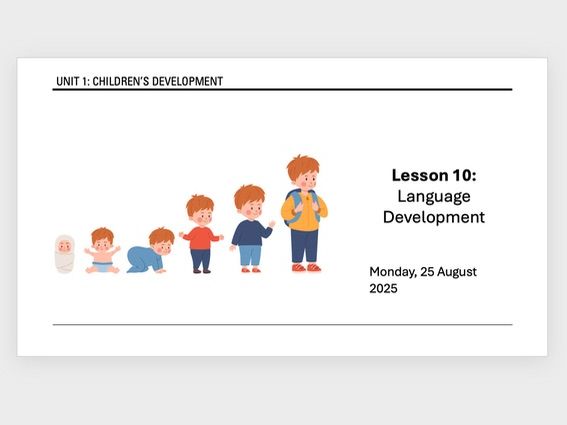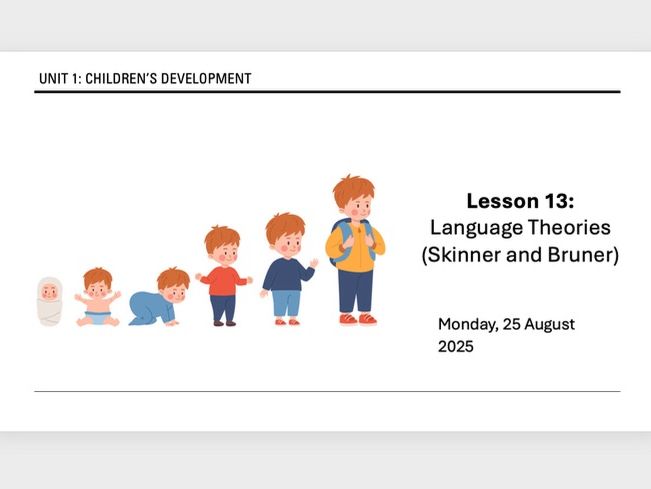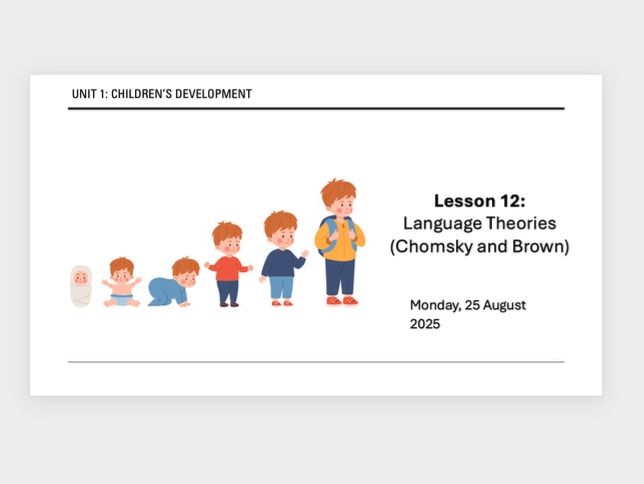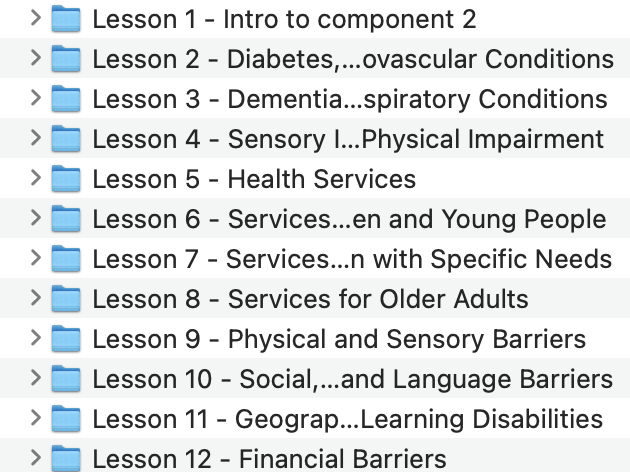24Uploads
300Views
66Downloads
All resources

Btec Tech Award (2022) Health and Social Care - Component 3 Revision Booklet
A 66-page revision booklet with clear explanations and plenty of practice exam questions to help students prepare with confidence

AAQ Early Childhood Development Unit 1 WHOLE UNIT (BTEC)
This resource pack contains a full set of 20 PowerPoint lessons for Unit 1: Children’s Development from the Pearson AAQ in Early Childhood Development.
The pack also includes 5 homework tasks to support learning outside the classroom and an assessment practice.
The lessons cover all the essential content and are student-friendly with clear explanations, diagrams and examples to support understanding. They are packed with plenty of activities, case studies and discussion prompts, as well as answers included – making them perfect for non-specialist teachers or cover staff.
All resources are ready to use but also fully editable and adaptable to your own learners.

AAQ Early Childhood Development Unit 1 - Factors Affecting Development A1.4 A1.5 A1.6 A1.7
This lesson explores the different factors that can influence a child’s development, including physical, social, emotional, and environmental aspects. Learners are encouraged to think critically about how these factors can impact growth and development in early childhood.
The resource includes:
Clear explanations of key factors affecting development
Engaging activities to support understanding and application
Fully adaptable materials to suit your class needs
Ideal for non-specialists, cover staff, or busy teachers, this lesson is a great way to build knowledge and spark discussion around the influences on child development.

AAQ Early Childhood Development Unit 1 - Principles of Growth and Development A1.1 A1.2 A1.3
Kickstart your unit with this engaging introduction to growth and development, focusing on the PILES (Physical, Intellectual, Language, Emotional, Social) framework.
This lesson includes:
Clear explanations of the principles of growth and development
Interactive activities to get learners thinking and participating
Perfect for non-specialists, cover staff, or busy teachers, this lesson is adaptable to suit any classroom and provides a strong foundation for future lessons.

AAQ Early Childhood Development Unit 1 - Promoting Physical Development B3
This lesson explores the ways practitioners and parents can promote physical development in children from birth to 8 years. Learners will consider activities, resources, and opportunities that encourage the development of both gross motor skills (e.g., climbing, running, balancing) and fine motor skills (e.g., cutting, writing, threading).
The resource includes:
Clear explanations of strategies to promote physical development (B3)
Engaging activities to support learning and discussion
Fully adaptable materials to suit your classroom needs
Ideal for non-specialists, cover staff, or busy teachers, this lesson helps students understand how adults can support children’s physical growth and development in early years settings.

AAQ Early Childhood Development Unit 1 - Cognitive Development 0-8 years C1
This lesson examines the stages of cognitive development from birth to 8 years, helping learners understand how children develop their thinking, memory, problem-solving, and language skills as they grow. Key theories and milestones are introduced to build a clear picture of early cognitive development.
The resource includes:
Clear explanations of cognitive development milestones (C1)
Interactive activities to support recall and application
Fully adaptable materials for different learner needs
Perfect for non-specialists, cover staff, or busy teachers, this lesson provides an engaging and structured approach to understanding how children’s thinking develops in the early years.

AAQ Early Childhood Development Unit 1 - Physical Development 0-8 Years B1 B2
This lesson focuses on the stages of physical development from birth to 8 years, covering key milestones in both gross motor skills (such as crawling, walking, and running) and fine motor skills (such as grasping, drawing, and writing). Learners will explore how physical abilities change as children grow and how these skills support wider development.
The resource includes:
Clear explanations of physical development milestones (B1 & B2)
Interactive activities to support recall and application
Fully adaptable materials for different learner needs
Perfect for non-specialists, cover staff, or busy teachers, this lesson provides an engaging and structured approach to understanding early childhood physical development.

AAQ Early Childhood Development Unit 1 - Promoting Cognitive and Language Development C2
This lesson focuses on how adults can promote children’s cognitive and language development from birth to 8 years. Learners will explore strategies, activities, and experiences that help children build their thinking, problem-solving, communication, and early literacy skills.
The resource includes:
Clear explanations of approaches to support cognitive and language development (C2)
Engaging activities to encourage application and discussion
Fully adaptable materials to suit the needs of your learners
Ideal for non-specialists, cover staff, or busy teachers, this lesson provides practical and engaging ways to understand how children’s learning and communication can be supported in the early years.

AAQ Early Childhood Development Unit 1 - Vygotsky & Bruner Theories of Cognitive Development C3.2/3
This lesson explores the influential theories of Lev Vygotsky and Jerome Bruner, focusing on how children’s learning and thinking develop through interaction and support. Learners will study Vygotsky’s concepts such as the Zone of Proximal Development (ZPD) and scaffolding, alongside Bruner’s ideas of spiral curriculum and the modes of representation. The lesson highlights how both theorists emphasise the importance of language, culture, and social interaction in learning.
The resource includes:
Clear explanations of Vygotsky and Bruner’s key theories (C3.2/3)
Activities to support understanding and application of theory
Fully adaptable materials to suit the needs of your learners
Ideal for non-specialists, cover staff, or busy teachers, this lesson provides an accessible way to explore two of the most significant cognitive development theories in early childhood.

AAQ Early Childhood Development Unit 1 - Piaget Theories of Cognitive Development C3.1
This lesson introduces learners to Jean Piaget’s theory of cognitive development, exploring the key stages of development (sensorimotor, pre-operational, concrete operational, and formal operational) and how these explain children’s learning and thinking from birth to 8 years. The lesson also covers Piaget’s key concepts of schemas, conservation, and egocentrism, helping learners to understand how children think and make sense of the world around them.
The resource includes:
Clear explanations of Piaget’s stages and key concepts (C3.1)
Activities to support understanding and application of theory
Fully adaptable materials to suit the needs of your learners
Perfect for non-specialists, cover staff, or busy teachers, this lesson provides an accessible and engaging introduction to one of the most influential theories in child development.

AAQ Early Childhood Development Unit 1 - Information Processing Theory Theories of Cog Dev C3.4
This lesson introduces learners to the Information Processing Theory of cognitive development, which compares the mind to a computer. Learners will explore how children take in information, store it, and use it, focusing on processes such as attention, memory, and problem-solving. The lesson also highlights how these skills develop with age and how adults can support children’s learning.
The resource includes:
Clear explanations of Information Processing Theory (C3.4)
Activities to support recall, application, and discussion
Fully adaptable materials to meet the needs of your learners
Perfect for non-specialists, cover staff, or busy teachers, this lesson provides an engaging way to understand how children’s thinking develops through information processing.

AAQ Early Childhood Development Unit 1 - Ainsworth & Schaffer & Emerson Attachment Theories E2 1.2/3
In this lesson, learners will explore the theories of Mary Ainsworth and Schaffer & Emerson on attachment. The lesson introduces Ainsworth’s Strange Situation study, highlighting the different types of attachment (secure, insecure-avoidant, and insecure-resistant), as well as Schaffer & Emerson’s stages of attachment and how bonds between infants and caregivers develop over time.
The resource includes:
Clear explanations of Ainsworth and Schaffer & Emerson’s theories (E2 1.2/1.3)
Activities to support discussion and application
Fully adaptable materials to suit different classroom needs
Perfect for non-specialists, cover staff, or busy teachers, this lesson provides an engaging and structured approach to understanding key attachment theories in child development.

AAQ Early Childhood Development Unit 1 - Emotional Development E1
In this lesson, learners will explore how children’s emotional development progresses from birth to 8 years. The lesson looks at how children form attachments, express feelings, and begin to develop skills such as self-awareness, empathy, and managing emotions. Learners will consider the importance of positive relationships and supportive environments in shaping healthy emotional growth.
The resource includes:
Clear explanations of stages of emotional development (E1)
Activities to support discussion and application
Fully adaptable materials to meet the needs of your learners
Perfect for non-specialists, cover staff, or busy teachers, this lesson provides a structured and engaging approach to understanding children’s emotional development.

AAQ Early Childhood Development Unit 1 - Bowlby Theories of Attachment E2 1.1
In this lesson, learners will explore John Bowlby’s theory of attachment, focusing on the importance of early relationships for a child’s emotional development. The lesson introduces Bowlby’s ideas of a secure base, monotropy, and the critical period for forming attachments. Learners will also consider the potential impact of disrupted or insecure attachments on later development.
The resource includes:
Clear explanations of Bowlby’s key concepts (E2 1.1)
Activities to support understanding and application
Fully adaptable materials to meet the needs of your learners
Perfect for non-specialists, cover staff, or busy teachers, this lesson provides an engaging and accessible way to understand one of the most influential theories of attachment.

AAQ Early Childhood Development Unit 1 - Social Development 0-8 Years F1 F2
In this lesson, learners will explore how children develop social skills and relationships from birth to 8 years. The lesson covers key aspects of social development, including sharing, cooperation, understanding rules, forming friendships, and interacting with peers and adults, as well as factors that influence social growth, such as family, culture, and environment.
The resource includes:
Clear explanations of stages and factors influencing social development (F1 & F2)
Activities to support discussion, reflection, and application
Fully adaptable materials to meet different classroom needs
Perfect for non-specialists, cover staff, or busy teachers, this lesson provides a structured and engaging approach to understanding how children develop socially in the early years.

AAQ Early Childhood Development Unit 1 - Bandura, Bronfenbrenner & Skinner Social Dev Theories F3
In this lesson, learners will explore the social development theories of Albert Bandura, Urie Bronfenbrenner, and B.F. Skinner. The lesson examines Bandura’s social learning theory and the role of modelling and imitation, Bronfenbrenner’s ecological systems theory and how different environments influence social growth, and Skinner’s behaviourist approach to learning social behaviours through reinforcement.
The resource includes:
Clear explanations of Bandura, Bronfenbrenner, and Skinner’s theories (F3)
Activities to support understanding and application of theory
Fully adaptable materials to suit different classroom needs
Ideal for non-specialists, cover staff, or busy teachers, this lesson provides an engaging and structured approach to understanding key social development theories in early childhood.

AAQ Early Childhood Development Unit 1 - Language Development D1 D2
In this lesson, learners will explore how children develop language and communication skills from birth to 8 years, focusing on key stages and milestones. The lesson looks at how children move from making sounds to using words and sentences, as well as the factors that can influence language development, such as interaction, environment, and experiences.
The resource includes:
Clear explanations of stages of language development (D1 & D2)
Activities to support recall, discussion, and application
Fully adaptable materials to suit different classroom needs
Perfect for non-specialists, cover staff, or busy teachers, this lesson offers a structured and engaging way to understand how children acquire and develop language in the early years.

AAQ Early Childhood Development Unit 1 - Skinner & Bruner Theories of Language Development D3.3 D3.4
In this lesson, learners will explore the theories of B.F. Skinner and Jerome Bruner on how children develop language. The lesson introduces Skinner’s behaviourist perspective, focusing on imitation, reinforcement, and conditioning, alongside Bruner’s view of social interaction and the role of adults in scaffolding language learning.
The resource includes:
Clear explanations of Skinner and Bruner’s theories (D3.3 & D3.4)
Activities to support discussion and application
Fully adaptable materials to suit different learner needs
Ideal for non-specialists, cover staff, or busy teachers, this lesson provides an engaging and accessible way to understand two influential theories of language development.

AAQ Early Childhood Development Unit 1 - Chomsky & Brown Theories of Language Development D3.1 D3.2
In this lesson, learners will explore the key theories of Noam Chomsky and Roger Brown on how children acquire language. The lesson introduces Chomsky’s idea of an innate language acquisition device (LAD) and Brown’s research on the stages of language development, helping learners understand how children progress from early words to more complex sentences.
The resource includes:
Clear explanations of Chomsky and Brown’s theories (D3.1 & D3.2)
Activities to support discussion and application
Fully adaptable materials to meet different learner needs
Ideal for non-specialists, cover staff, or busy teachers, this lesson provides an accessible and engaging way to understand two influential theories of language development.

BTEC Tech Award 2022 Level 2 Health and Social Care Component 2 LAA
This free resource is designed to support teaching and learning for the BTEC Tech Award (2022) Level 2 Health and Social Care – Component 2: Health and Social Care Services and Values (Learning Aim A: Understand the different health and social care services and barriers to accessing them).

